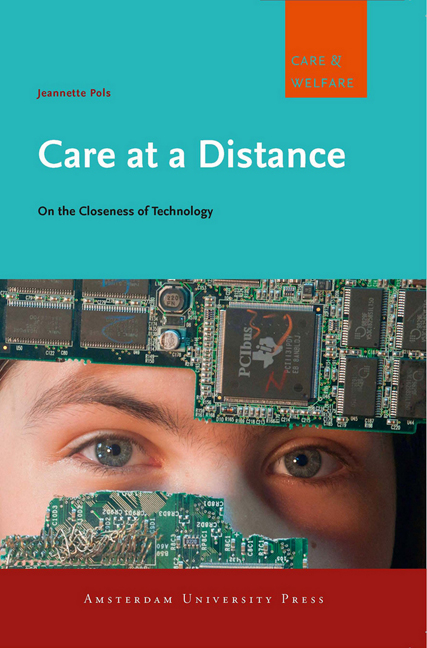Book contents
- Frontmatter
- Contents
- Nightmares, Promises and Efficiencies in care and Research
- Part I Norms and Nightmares
- Part II Knowledge and Promises
- Part III Routines and Efficiencies
- Conclusions: On Studying Innovation
- Acknowledgements
- Appendix: Projects Studied for this Book
- Notes
- References
- Index of Names
- Index of Subjects
2 - Caring Devices: About warm Hands, cold Technology and Making Things Fit
Published online by Cambridge University Press: 03 February 2021
- Frontmatter
- Contents
- Nightmares, Promises and Efficiencies in care and Research
- Part I Norms and Nightmares
- Part II Knowledge and Promises
- Part III Routines and Efficiencies
- Conclusions: On Studying Innovation
- Acknowledgements
- Appendix: Projects Studied for this Book
- Notes
- References
- Index of Names
- Index of Subjects
Summary
Warm care, cold technologies
Theorists of medicine as well as lay people often put healthcare technology, including telecare, in opposition to warm human care and contact. They assume that medical technology is cold, rational and functional, whereas human care is affective and comforting. Where does this opposition of warm and cold care come from? Social theorists often distinguish care from biomedicine and management, presenting the latter as examples of the Habermassian system world. This system world has a logic of instrumentality and threatens to colonise the ‘life world’ characterised by intersubjective relations. Opposing biomedicine and care in the trope of ‘system world conquers life world’ makes a spatial contrast. On the one hand, there are biomedical practices dominated by technical, objectifying and causal reasoning about the body and its diseases. On the other hand, warm care occurs between people, and patient subjectivity flourishes in the empathic relations between carer and patient at home. Warm care relates to sensitivity and concern, to ‘being there’ for those in need.
Although theorists accept that there is a legitimate space for detached and objectified medical treatment, for instance, in setting the proverbial broken bone, the opposition of warm and cold is partial to warmth. The metaphors criticise instrumental and objectifying treatments by pointing to the concern for the shivering patient needing a warm blanket after the bone-setting operation. Although necessary, the operation is a cold technical intervention, whereas the blanket signifies warm care and thus makes the practice ‘good’. Warmth, then, equals goodness.
Ironically, theorists often interpret the work of Michel Foucault, the philosopher who so subtly analysed the advent of clinical knowledge, as critical of medical rationality. David Armstrong (1983), for instance, interprets Foucault's analyses as conceiving all medical knowledge as a form of discipline or surveillance. People start regarding themselves and others with a monolithic, totalitarian medical gaze. For these Foucault interpreters, subjectivity is not merely oppressed but is invaded and shaped by a medical logic that disciplines the ways individuals behave and perceive themselves. Without being aware of it, people reshape themselves according to medical norms.
- Type
- Chapter
- Information
- Care at a DistanceOn the Closeness of Technology, pp. 25 - 44Publisher: Amsterdam University PressPrint publication year: 2012



